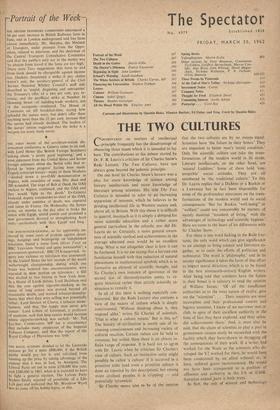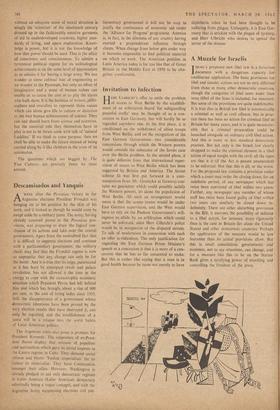THE TWO CULTURES
CONTROVERSY on matters of intellectual principle frequently has the disadvantage of obscuring those issues which it is intended to lay bare. The contributions to the debate started..bv Dr. F. R. Leavis's criticism of Sir Charles Snow's Rede Lecture, The Two Cultures, have not always gone beyond the polemic principle. '
On one level Sir Charles Snow's lecture was a plea for more knowledge of science among literary intellectuals and more knowledge of literature among scientists. His title The Two Cultures is intended to refer to an increasing separation of interests, which he believes to be dividing intellectual life in Western society and, above all, in Britain. With this thesis it is difficult to quarrel, inasmuch as it is simply a demand for more scientific education and a rather more general curriculum in the schools; nor did Dr. Leavis do so. Certainly, a more general aware- ness of scientific method and achievements in the average educated man would be an excellent thing. What is not altogether clear is how it can be furthered. It is no use saying that a layman can familiarise himself with that reduction of natural phenomena to mathematical symbols which is so formative an element of scientific thought, and Sir Charles's own instance of ignorance of the second law of thermodynamics seems to re- quire historical rather than strictly scientific in- struction to remedy it.
In all of this there is nothing especially con- troversial. But the Rede Lecture also contains a view of the nature of culture which is deeply controversial. 'Without thinking about it, they respond alike,' writes Sir Charles of scientists. 'That is what a culture means.' But is this so? The history of-civilisation is surely one of in- creasing consciousness and increasing variety of cultural reaction. Certain values can be held in common, but within these there is an almost in- finite range of response. It is hard not to agree with Dr. Leavis when he criticises Sir Charles's view of culture. Such an instinctive unity might possibly be called 'a culture' if it occurred in a primitive tribe (and even a primitive culture is done an injustice by this description), but among more civilised peoples it is crippling — and potentially tyrannical.
Sir Charles seems also to be of the opinion that the two cultures are by no means equal. Scientists have 'the future in their bones.' They are impatient to better man's 'social condition.' Only the scientific culture can take the trans- formations of the modern world in its stride. Literary intellectuals, on the other hand, are 'natural Luddites.' Some of them hold 'con- temptible' social attitudes. They are all smothered in 'the traditional culture.' To this Dr. Leavis replies that a Dickens ora Ruskin or a Lawrence has in fact been responsible for some of the profoundest utterances on the trans- formations of the modern world and its social consequences. 'But for Ruskin "well-being" or "welfare" could not conceivably be matters of merely material "standard of living," with the advantages of technology and scientific hygiene.' Here we,come to the heart of his differences with Sir Charles Snow.
For there is one word lacking in the Rede Lec- tures, the only word which can give significance to an attempt to bring science and literature to- gether, or to unite the efforts of politician and technocrat. The word is 'philosophy,' and in its secular significance it takes the form of that effort to impart moral direction, which is to be found in the best nineteenth-century English writers. After being told that scientists have the future in their bones it is salutary to read the opinion of William James: 'Of all the insufficient authorities as to the total nature of reality, give me the "scientists". . . . Their interests are most incomplete and their professional conceit and bigotry immense. I know of no narrower sect or club, in spite of their excellent authority in the lines of fact they have explored, and their splen- did achievements there.' And, it must also be said, that the claim of scientists to play a part in government cannot easily be reconciled with the facility which they have shown in shrugging off the consequences of their work. If a writer had worked for the Nazis as the scientists who de- veloped the V2 worked for them, he would have been condemned by an allied tribunal or, at least, suffered grave inconvenience. He would not have been transported to a. position of affluence and authority in the US or USSR. Scientists cannot „have it both ways.
In fart, the cult of science and technology without an adequate sense of moral direction is simply the 'scientism' of the nineteenth century dressed up in the fashionably emotive garments of aid to underdeveloped countries, higher stan- dards of living, and space exploration. Know- ledge is power, but it is not the knowledge of how that power should be used. That is the affair of conscience and consciousness. To admire a tyrannical political regime for its technological achievements is on the same level of appreciation as to admire it for having a large army. We can wonder at some colossal feat of engineering as we wonder at the Pyramids, but only an effort of imagination and a sense of human values can enable us to count the cost or to pity the slaves who built them. It is the business of writers, philo- sophers and moralists to represent those values which can alone give life to culture or direction to the vast human achievements of science. They can and should learn from science and scientists, but the essential role they themselves have to play is not to be thrust aside with talk of 'natural Luddites.' If we think to some purpose, then we shall be able to make the future instead of being carried along by it like children in the arms of an automaton.
The questions which are begged by The Two Cultures are precisely those we must answer.















































 Previous page
Previous page